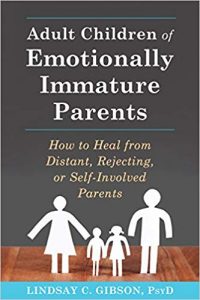 In this post I wanted to bring attention to the book Adult Children of Emotionally Immature Parents: How to Heal from Distant, Rejecting, or Self-Involved Parents. Of the 2,000+ books that are in our Work/Life Library, this is a book that I refer to most often. I continue to receive positive responses from those who read it.
In this post I wanted to bring attention to the book Adult Children of Emotionally Immature Parents: How to Heal from Distant, Rejecting, or Self-Involved Parents. Of the 2,000+ books that are in our Work/Life Library, this is a book that I refer to most often. I continue to receive positive responses from those who read it.
In my social work career I’ve met with many people who recount the challenges of their upbringing. They were provided the basic tenants of survival like shelter, clothing and food, yet their parent’s capacity for healthy emotional connection was impaired. “Impaired” can look like either a lack of positive interaction or an abundance of unhealthy interaction, expectation, control, or neediness. Because their parent did provide for things like food and shelter, it is easy to minimize the challenges they did face and how those challenges impact them still as adults.
What I appreciate about this book is that it validates all that the child must navigate when a parent is not dependable for things like feelings of security, comfort, emotional validation or predictability. In an effort to get what they need from this parent they might end up becoming hyperaware of that parent’s stressors and then overcompensating to help the parent avoid them… or silencing thoughts, feelings and needs so as not to disrupt or provoke… or providing an overabundance of positivity, order, or empathy that is otherwise lacking in the household.
That takes a lot of mental gymnastics. And I’ve not even scratched the surface.
Gibson explains, “As a child, if you found a role that fit your parent’s needs like a key in a lock, you probably would have quickly identified with this role-self. In the process, your true self would have become more invisible as you transformed into what your family system needed you to be.”
Do any of these subjects from the book sound relatable?
Adopting Compensatory Cheerfulness
Doing Emotional Work for Parents
Freedom from Excessive Empathy
Freedom to Be Human and Imperfect
How to Avoid Getting Hooked by an Emotionally Immature Parent
If this resonates, one may find this book helpful. If this sounds like it would resonate with a significant other, then I encourage both partners to read it as it may provide some insight and lead the way to helpful discussions.
If you'd like the support of a therapist in addressing these topics, you can search for a provider through your insurance network or by using sites like Psychology Today. The Work/Life Center supports employees and their families by providing information on local resources.
Adult Children of Emotionally Immature Parents: How to Heal from Distant, Rejecting, or Self-Involved Parents by Lindsay C. Gibson, clinical psychologist.
This blog has been updated to note that a follow-up books has been published by the author: Recovering from Emotionally Immature Parents: Practical Tools to Establish Boundaries and Reclaim Your Emotional Autonomy

